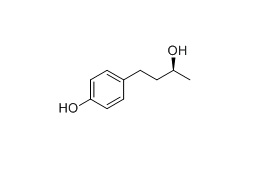(+)-Rhododendrol
(+)-Rhododendrol shows anti-inflammatory effects, it can suppress the NO production by activated macrophages in vivo.
Inquire / Order:
manager@chemfaces.com
Technical Inquiries:
service@chemfaces.com
Tel:
+86-27-84237783
Fax:
+86-27-84254680
Address:
1 Building, No. 83, CheCheng Rd., Wuhan Economic and Technological Development Zone, Wuhan, Hubei 430056, PRC
Providing storage is as stated on the product vial and the vial is kept tightly sealed, the product can be stored for up to
24 months(2-8C).
Wherever possible, you should prepare and use solutions on the same day. However, if you need to make up stock solutions in advance, we recommend that you store the solution as aliquots in tightly sealed vials at -20C. Generally, these will be useable for up to two weeks. Before use, and prior to opening the vial we recommend that you allow your product to equilibrate to room temperature for at least 1 hour.
Need more advice on solubility, usage and handling? Please email to: service@chemfaces.com
The packaging of the product may have turned upside down during transportation, resulting in the natural compounds adhering to the neck or cap of the vial. take the vial out of its packaging and gently shake to let the compounds fall to the bottom of the vial. for liquid products, centrifuge at 200-500 RPM to gather the liquid at the bottom of the vial. try to avoid loss or contamination during handling.
J. Food Composition and Analysis2022, 114:104731
Sustainability2021, 13(23),12981.
Kaohsiung J Med Sci.2024, 40(3):280-290.
Foods.2022, 11(6):882.
University of Manitoba2023, 37433.
Sci Adv.2018, 4(10)
Molecules.2019, 24(24),4583
Molecules.2021, 26(3):695.
Korean Herb. Med. Inf.2020, 8(2):205-213
Molecules.2019, 24(11):E2102
Related and Featured Products
Planta Med. 1998 Oct;64(7):598-602.
(+)-rhododendrol and epi-rhododendrin suppress the NO production by activated macrophages in vivo.[Pubmed:
9810263 ]
METHODS AND RESULTS:
In this study, we investigated the effect of (+)-Rhododendrol (1) and epi-rhododendrin (2) isolated from Acer nikoense Maxim. (Aceraceae) on nitric oxide (NO) production in mouse peritoneal macrophages elicited by bacillus Calmette-Guérin and in vitro stimulated by lipopolysaccharide. The NO production was not affected by an oral administration of methanol extract at a dose of 100 mg/kg/day. However, the AcOEt soluble fraction significantly reduced the NO production. (+)-Rhododendrol (1) isolated as an active substance from the AcOEt fraction suppressed the NO production. epi-Rhododendrin (2), the glucoside of (+)-Rhododendrol (1) isolated from the n-BuOH fraction, also suppressed the NO production.
CONCLUSIONS:
As NO is one of the critical mediators in inflammation, these results suggest that (+)-Rhododendrol (1) and epi-rhododendrin (2) contribute in part to the anti-inflammatory effect of A. nikoense.



